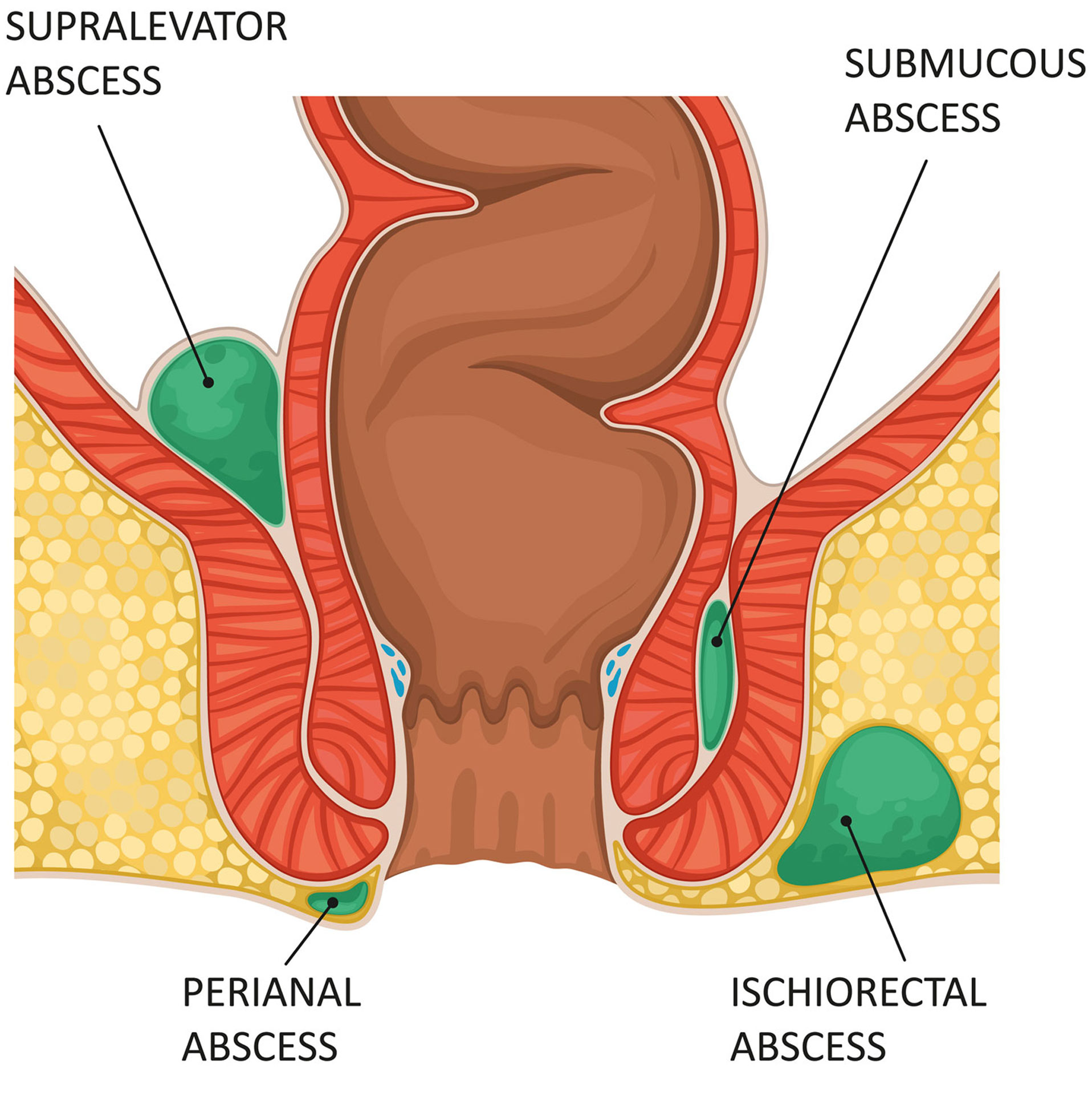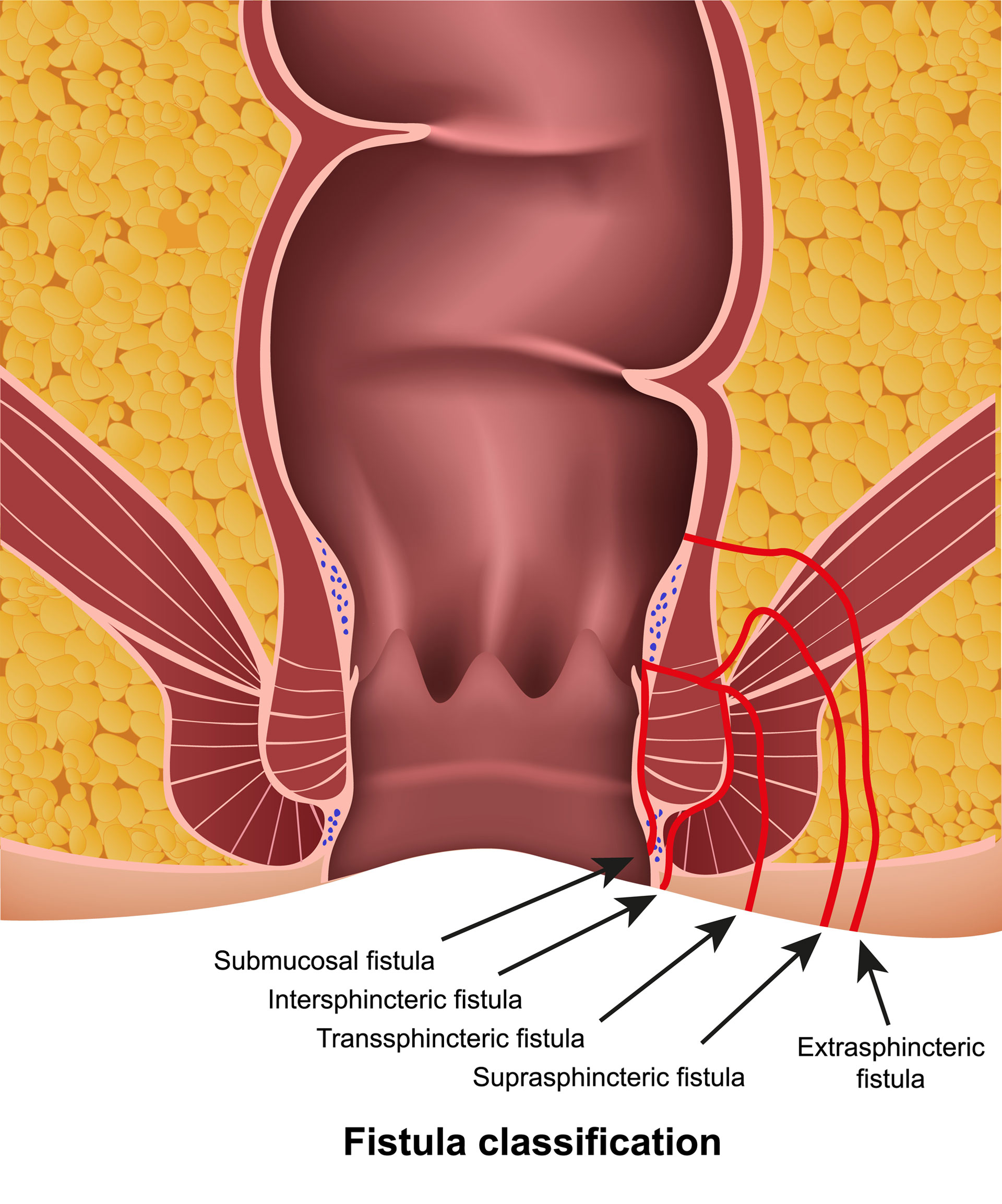Conditions And Treatments
Home / Areas Of Specialty / Anal Rectal Abscess And Anal Fistulas
Anal Rectal Abscess And Fistulas
Anal rectal abscess and Anal fistulas are very common problem in the anorectal area. The most common reason for this problem is from the infection of one of the glands in the anal area. As a result, this can form an abscess in the region around the anus. However, Anal fistula is a chronic infection which usually can form on an average in about 50% of the patients after the resolution of Anal Rectal abscess.
Most common reason for the Anal abscess and fistula is spontaneous infection. Patients who have have chronic inflammatory bowel disease (IBD) like Crohn’s disease are also prone to formation of Anal fistulas.
Anal fistula is defined as a tunnel which has two openings one of which usually is inside the anal canal and the other is visible outside. It happens because of chronic infection as described above. You can have two types of fistulas, Simple and complex. Complex fistulas can tract through the muscles or in between the muscles. Additionally, complex fistulas may require multiple surgical interventions.


Symptoms And Signs of Anal Rectal Abscess and Fistulas
You may have symptoms as rectal pain, redness and swelling in the anal rectal area. Other symptoms include purulent yellow discharge or blood from anorectal area, irritation and itching and difficulty with the bowel movements.
If you have anal fistula, commonly it forms after the resolution of anal rectal abscess. But, occasionally you can develop anal fistula without any clear history of anal rectal abscess. Concurrently, you may have drainage of blood or pus with the itching and irritation. You can have a typical history of recurrent abscess formation at the same site over the duration of months or years. Because, you may confuse this with a simple hemorrhoid problem, so you may not seek immediate treatment. This can worsen the disease. You should seek immediate intervention and evaluation from colorectal surgeon if have any of these symptoms.
Diagnosis of Anorectal Abscess
Most common way to diagnose the abscess or anal fistula is by clinical evaluation and the patient’s history. Sometimes, you may need imaging tests like CT scan and MRI to make further diagnosis. Many times, you can have a deep rectal abscess which is not visualized from external exam and CT scan or other specialized scans are needed for evaluation. If you have anal fistula then usually there is a very typical history of recurrent abscess formation and the presence of a sinus/opening at the anal area. You will often feel a lump or swelling around the anus which keeps recurring. Anal fistulas can be very complex and different types based on their location.
Treatment of Anal Rectal Abscess and Fistulas
The most common treatment for the Anal Rectal abscess is a surgical drainage. If you have a simple abscess, certainly it can be drained in the office under local anesthesia by your colorectal surgeon. Your Colorectal surgeon may advise you to have abscess drainage under anesthesia If the abscess is complex or extensive. Your physician may prescribe you antibiotics to treat the abscess under many circumstances based on your history, medical condition and the extent of the disease. Another key point is that your colorectal surgeon may place a special dressing or packing at the abscess site which may need to be removed in 24 to 48 hours. Your surgeon will tell you about the post procedure care. But if you have any questions then please make sure to ask your colorectal surgeon.
Do All Fistulas Require One Stage Surgery ?
The treatment for the anal fistula usually depends on the type of fistula. It may be a one stage surgery as long as it is a simple fistula. Your colorectal surgeon can treat simple fistula with a fistulotomy procedure by opening the fistula tract. You may need a multistage surgery (Multiple Surgeries) for a complex anal fistula. This may require the placement of a special type of a drain called seton during the 1st stage. It is usually followed by 2nd stage. Second stage procedures include LIFT (ligation of intersphincteric fistula tract) , fibrin glue injection, anal fistula plug, anal fistula advancement flap or other similar procedures. Your colorectal surgeon will perform these procedures to preserve anal sphincter muscle. This lessens the chances of having anal stool/fecal leakage or incontinence problem.
Your colorectal surgeon will explain you about the details as they can be sometime hard to understand. As a matter of fact, anal abscess or fistulas can recur and may require repeat surgeries.
What is a colon and Rectal Surgeon? Is Dr Singh a Board-certified Colorectal surgeon? and where does he perform his procedures.
Colon and rectal surgeons are experts in the surgical and non-surgical treatment of diseases of the colon, rectum, and anus. They have completed advanced surgical training in the treatment of these diseases, as well as full general surgical training. They are well versed in the treatment of both benign and malignant diseases of the colon, rectum, and anus and are able to perform routine screening examinations and surgically treat conditions as and if needed. Dr Singh is a double board certified in Colon and Rectal Surgery and General surgery. His practice is located in Phoenix, Glendale and Scottsdale, AZ.
For more detailed information please click on the following link :
Abscess and Fistula Expanded Information | ASCRS (fascrs.org)
Home – Colon & Rectal Care Center of Phoenix (colorectaldoc.com)

